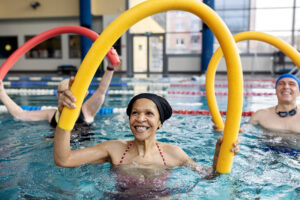Alzheimer’s Disease affects everyone around it, not only the person bearing the disease. Balancing support between the person suffering and those providing care can prove a daunting task. It’s important to hear from people that share your experience and recognize you’re not alone in your struggle.
As we recognize Alzheimer’s Disease Awareness Month this November, we’ve compiled a list of some of the best TED Talks regarding the disease. Whether you have contracted the disease, have a loved one with it, are at risk for it or are just curious about dementias – we hope these TED Talks can help. Some of the topics covered are:
• Preventing the disease
• Connecting with loved ones with Alzheimer’s
• The difficulties of providing care for a parent with the disease
What are TED Talks?
TED is a nonprofit organization devoted to spreading ideas, usually in the form of short, powerful talks. Founded in 1984 as a conference on Technology, Entertainment and Design, TED has expanded to being a global collection of communities and initiatives that welcomes people from every discipline and culture and discusses a range of issues.
TED Talks are presented by scientists, researchers, artists, business leaders and other experts who share insights and research in their fields.
1. What is Alzheimer’s Disease?
“Alzheimer’s disease is the most common cause of dementia, affecting over 40 million people worldwide. And though it was discovered over a century ago, scientists are still grappling for a cure.”
In this short talk, researcher Ivan Seah Yu Jun describes how Alzheimer’s affects the brain and gives details on the stages of the disease.
2. What You Can do to Prevent Alzheimer’s
In this video, Dr. Lisa Genova, yogi, neuroscientist and author of “Still Alice” describes risk factors of Alzheimer’s, and best steps to take to prevent its onset. Using real world examples and animations, Dr. Genova paints a very real picture of the disease and details new insights.
3. How to Meaningfully Reconnect with Those Who Have Dementia
In her talk, Professor and artist Anne Basting discusses infusing arts and humanities into care settings dedicated to people with cognitive disabilities.
In less than 15 minutes, she details opening “paths of discovery” with those affected by Alzheimer’s, and the retaining their sense of imagination and wonder, overall providing a very detailed and insightful glimpse into life while caring for every level of the disease.
4. How I’m Preparing to get Alzheimer’s
When faced with a parent suffering from Alzheimer’s, many of us respond with denial or extreme efforts at prevention. However, global health expert and TED Fellow Alanna Shaikh takes a different view.
In her TED Talk she discusses caring for a parent with Alzheimer’s disease, dealing with the knowledge that she is genetically predisposed to the condition, and the three concrete steps she’s taking to prepare for the possibility of a diagnosis.
5. The Hidden Role Informal Caregivers Play in Healthcare
Once a cared-for patient and now a caregiver himself, public health expert Scott Williams highlights the invaluable role of informal caregivers — friends and relatives who go the extra mile for patients in need. These caregivers care for loved ones with a range of conditions, from injuries to dementias.
Caring for those affected by, being diagnosed with, or preparing for an Alzheimer’s diagnosis can be incredibly challenging. We sincerely hope that these captivating TED talks not only provide valuable information, but also offer meaningful insights into effectively managing this condition, whether it is for yourself or your loved ones.
Maxim provides a wide range of services to individuals with injuries and illnesses, including respite care and private duty nursing. If you are interested in Maxim’s services, contact your local office to learn more about the options available.
*The views and opinions expressed in these TED Talks do not necessarily reflect the view of Maxim Healthcare Services. These presentations are for entertainment purposes and should not be used as a source of medical advice.*



